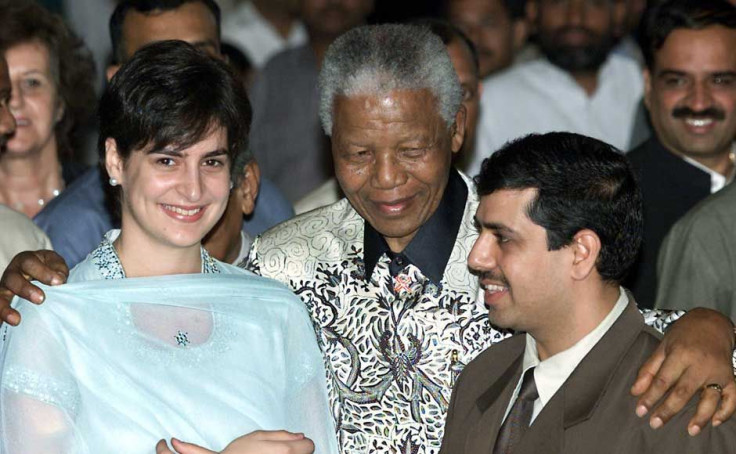Nelson Mandela Dies: South Asia Mourns Passing Of South Africa’s Anti-Apartheid Icon

The death of anti-apartheid leader Nelson Mandela in South Africa has struck the Indian subcontinent hard, triggering a massive wave of tributes to the former president of his country. Mandela died on Thursday at the age of 95 after months of illness.
The Indian government, which granted Mandela its highest civilian honor, the Bharat Ratna (Jewel of India), in 1990 (he remains only one of two non-Indians to be so honored, the other was Mother Teresa), will send a high-level delegation to attend Mandela’s funeral in Johannesburg.
"Both Prime Minister [Manmohan Singh] and President [Pranab Mukherjee] have indicated the reverence that we in India hold Nelson Mandela in,” said a spokesperson for India’s ministry of external affairs. “His death is not only a loss for South Africa but for India and the world too,” the ministry added.
India has declared a five-day period of mourning to honor Mandela, with government buildings flying flags at half-mast. Both houses of parliament in New Delhi adjourned for Friday in a rare display of respect for a foreigner. Prime Minister Singh condoled that Mandela was a "giant among men" and a “great friend of India.” “His life and work will remain a source of eternal inspiration for generations to come. I join all those who are praying for his soul,” Singh gushed.
"President Mandela was a statesman, world leader and icon of inspiration of humanity," said President Mukherjee in a statement. Mukherjee added that he conveys “heartfelt condolences on behalf of the people and the Government of India as well as my personal behalf to the family members of late President Mandela and the people and the Government of South Africa.” The most powerful woman in India, Congress Party leader Sonia Gandhi, also praised Mandela before parliament as “a true leader who led his nation always from the front. He was an inspiration and support for millions. He redefined the meaning of courage and sacrifice,” she said, adding that his courage was “superhuman.”
Mandela had a long association with Indians and Indian people stretching back to his early days as an anti-apartheid activist in South Africa, where many of his colleagues (and later fellow inmates in prison) were of Indian descent. When Mandela was elected president of South Africa in 1994, he named six Indian people to the cabinet. Although he didn’t always preach nonviolence, Mandela revered the memory of Indian independence hero Mohandas "Mahatma" Gandhi (Gandhi spent many years in South Africa in the early 20th century as a British-trained attorney). During a visit to Ahmedabad, India, in 1995 to honor Gandhi, Mandela declared: "I could never reach the standard of morality, simplicity and love for the poor set by the Mahatma. ... While Gandhi was a human without weaknesses, I am a man of many weaknesses." Six years later, the Indian government also awarded Mandela the International Gandhi Peace Price for his "exemplary work for promotion of peace and non-violence."
Indian media also piled on lavish praise for the departed South African hero, with The Hindu newspaper lamenting that "our world is a sadder, gloomier place for his passing.” The Indian Express newspaper credited Mandela for bringing to an end “the much-despised apartheid regime in South Africa while spreading the spirit of freedom in the rest of Africa.” CNN-India characterized Mandela as "heroic in his deeds, graceful in his manner, sainted in his image.”
Pakistanis also hailed Mandela – parliament in Islamabad adjourned for Friday’s session in his honor. President Mamnoon Hussain and Prime Minister Nawaz Sharif expressed their condolences over Mandela’s passing. “Pakistan wishes the South African people to bear this irreparable loss with courage and fortitude,” the assembly said in a resolution. (Mandela visited Pakistan twice and also addressed the parliament.) “I had the privilege to meet [Mandela] and he named the founder of Pakistan Muhammad Ali Jinnah and the Indian freedom fighter Mahatma Gandhi amongst his inspirations,” stated opposition leader Imran Khan.
Malala Yousafzai, the Pakistani teenaged girl who herself became a global icon for women's education rights called Mandela “my leader.” The 16-year-old girl who survived a gunshot to the head by Taliban and now lives in England said Mandela will "never die" and serves as "perpetual inspiration" for people around the world. "He belongs to the whole world because he is an icon of equality, freedom and love, the values we need all the time everywhere. His long, long struggle is a great demonstration of humanity," she said in a statement. "I have learned so much from Nelson Mandela and he has been my leader. He is a perpetual inspiration for me and millions of others around the world.”
Meanwhile, Bangladesh declared a three-day period of mourning in Mandela’s honor. Bangladesh President Abdul Hamid, Prime Minister Sheikh Hasina and the leader of the Opposition, Khaleda Zia, all delivered their messages of sympathy for Mandela’s family. Mandela visited Bangladesh in March 1997.
© Copyright IBTimes 2024. All rights reserved.





















